By Brad Friedman from Richfield, Utah...
 If there's a more ineffective federal agency than the U.S. Election Assistance Commission (EAC), we're unaware of it.
If there's a more ineffective federal agency than the U.S. Election Assistance Commission (EAC), we're unaware of it.
The EAC was created in 2002 by the Help America Vote Act (HAVA), in large part to oversee federal certification and maintenance of e-voting systems for the entire country. One of their key mandates was to be a "clearinghouse" for information concerning such systems. Though they have been twice reprimanded by the non-partisan Government Accountability Office (GAO) for their failure to set up such a clearinghouse of information concerning known problems with voting systems, another news report over the weekend confirms that they are more determined than ever to avoid any such responsibility.
Incredible comments given by EAC spokesperson Jeannie Layson and EAC Chairwoman Donnetta Davidson to the Daytona Beach News-Journal underscore the agency's hellbent efforts to avoid any and all responsibility for alerting election officials to known failures of electronic voting systems made by private corporations such as Diebold, ES&S, Sequoia, and others.
The BRAD BLOG has chronicled the short, but storied, history of the EAC's failures, compromised nature, and unwillingness to do their job over the years, but the latest comments --- and subsequent lack of action --- as reported yesterday by M.C. Moewe in the News-Journal are nothing short of astonishing...
Two weeks ago, the News-Journal reported on massive memory card failures discovered in Diebold's voting machines, as found across the state of Florida, and even confirmed by the company. We covered the voting machine company's latest failure, and noted that, as with other critical failures previously confirmed, the EAC had once again refused to inform Election Officials in other states and counties, who are using the same equipment, of the confirmed failures.
The BRAD BLOG has, nearly-exclusively, chronicled similar situations over the past many months. One example is the case of a state-commissioned study at Florida State University which revealed the ES&S iVotronic touch-screen voting system was vulnerable to a vote-flipping virus. In that report, we detailed EAC spokesperson Layson's remarkable written refusals, on behalf of the EAC, to notify other jurisdictions that used that same system, across 16 different states, of the critical problem discovered by the computer scientists at FSU.
Moewe has now advanced the story of EAC's failure to meet their clearinghouse mandate by questioning the agency on their continuing refusal to notify states of such problems.
Remarkably, instead of speaking to their failure to notify jurisdictions of such known problems, Layson and Davidson, the former Secretary of State of Colorado who oversaw the certification of voting systems that were subsequently decertified by a state judge for lack of any credible testing procedures, avoided the question repeatedly. They insisted, instead, that they do not have a mandate to regulate state voting procedures. That much may be true, but it wasn't the question.
"EAC does not have any regulatory authority over states with respect to the voting systems they use," Layson wrote to the paper in response to a series of questions they had sent. Never mind that the question was not about regulation, it was about notification.
In 2005, the GAO filed their first report [PDF] noting the EAC's failure to meet their federal mandate, stating:
In 2006, a followup report [PDF] submitted to a congressional panel, they declared the situation had not improved since their earlier report.
As Moewe reported yesterday concerning the latest problem found with Diebold memory cards, which could result in lost votes on thousands of machines across the country, "Officials with the Election Assistance Commission said it would not disseminate the information about the 25,000 optical scan machines unless an official agency such as a state or county requested the action."
So only if a state or county requests that other states and counties be informed will the EAC disseminate such information. And, even in those cases, the agency has forced such jurisdictions to jump through incredible hoops.
For example, the News-Journal reports that though Florida had notified the EAC about findings from their recent state study on voting systems, the state "has been asked to resubmit it under the commission's new clearinghouse policies" before they will even bother to post a link to the study on their website.
Most astonishing of all, perhaps, are the comments reported at the end of Moewe's article from EAC Chair Davidson, stating (incredibly enough) that they are waiting for Diebold to notify them about the confirmed failures that might effect 25,000 voting machines across the country in the 2008 elections...
"If the manufacturer sends us a letter we will put up a letter," Davidson said.
No doubt, Diebold --- which has already refused to release information on the extent of the recently discovered voting system malfunctions, citing its collected data as "proprietary business information" --- will waste no time in requesting that the EAC notify states and counties that Diebold voting machines have critical flaws in them.
Once again, it has become clear that the EAC is an extraordinary failure from top to bottom. Congress needs to take action immediately, though we're not holding our breath for that either.


 'Green News Report' 1/20/26
'Green News Report' 1/20/26
 Sunday 'Domestic Terrorist' Toons
Sunday 'Domestic Terrorist' Toons 'A Cornered Rat is a Dangerous Rat': Trump Terrorizes Minn., Menaces NATO, World: 'BradCast' 1/15/26
'A Cornered Rat is a Dangerous Rat': Trump Terrorizes Minn., Menaces NATO, World: 'BradCast' 1/15/26 'Green News Report' 1/15/26
'Green News Report' 1/15/26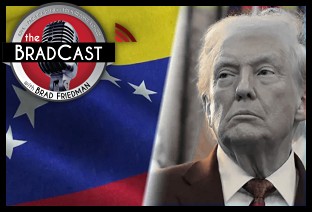 'This Isn't Close to Over': Mad King Trump in Venezuela (and Beyond): 'BradCast' 1/14
'This Isn't Close to Over': Mad King Trump in Venezuela (and Beyond): 'BradCast' 1/14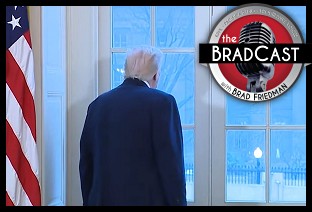 Things Getting Weirder as Trump Keeps Losing: 'BradCast' 1/13/26
Things Getting Weirder as Trump Keeps Losing: 'BradCast' 1/13/26 'Green News Report' 1/13/26
'Green News Report' 1/13/26 After ICE Murder in MN, Local Cops Disown Fed Policing Practices: 'BradCast' 1/12/26
After ICE Murder in MN, Local Cops Disown Fed Policing Practices: 'BradCast' 1/12/26 Sunday 'Ice Age' Toons
Sunday 'Ice Age' Toons 'Green News Report' 1/8/26
'Green News Report' 1/8/26 Trump to Congress, Climate, U.N., Rule of Law: DROP DEAD - 'BradCast' 1/8/26
Trump to Congress, Climate, U.N., Rule of Law: DROP DEAD - 'BradCast' 1/8/26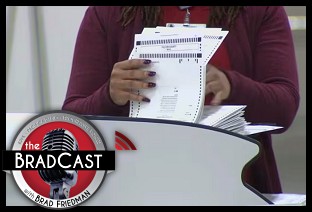 'Nonsense': Trumpers Claim 315k Fraudulent GA Votes in 2020: 'BradCast' 1/7/26
'Nonsense': Trumpers Claim 315k Fraudulent GA Votes in 2020: 'BradCast' 1/7/26 Jack Smith Testimony on Trump J6 Crimes, DOJ Weaponization: 'BradCast' 1/6/26
Jack Smith Testimony on Trump J6 Crimes, DOJ Weaponization: 'BradCast' 1/6/26 Trump War on Venez. is About Ego, Power, 'Alien Enemies Act': 'BradCast' 1/5/26
Trump War on Venez. is About Ego, Power, 'Alien Enemies Act': 'BradCast' 1/5/26 Have a Holly Jolly Somehow
Have a Holly Jolly Somehow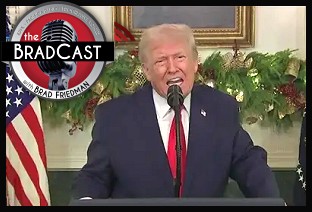 Old Man Shouts at People from WH for 20 Minutes: 'BradCast' 12/18/25
Old Man Shouts at People from WH for 20 Minutes: 'BradCast' 12/18/25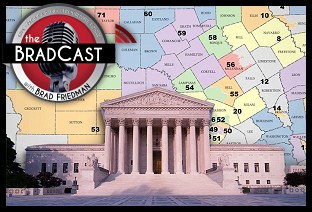 SCOTUS' How-To on Gerrymandering on 'Eve' of Election Year: BradCast' 12/17/25
SCOTUS' How-To on Gerrymandering on 'Eve' of Election Year: BradCast' 12/17/25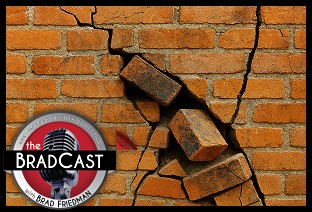 Bricks in the Wall: 'BradCast' 12/16/25
Bricks in the Wall: 'BradCast' 12/16/25
 VA GOP VOTER REG FRAUDSTER OFF HOOK
VA GOP VOTER REG FRAUDSTER OFF HOOK Criminal GOP Voter Registration Fraud Probe Expanding in VA
Criminal GOP Voter Registration Fraud Probe Expanding in VA DOJ PROBE SOUGHT AFTER VA ARREST
DOJ PROBE SOUGHT AFTER VA ARREST Arrest in VA: GOP Voter Reg Scandal Widens
Arrest in VA: GOP Voter Reg Scandal Widens ALL TOGETHER: ROVE, SPROUL, KOCHS, RNC
ALL TOGETHER: ROVE, SPROUL, KOCHS, RNC LATimes: RNC's 'Fired' Sproul Working for Repubs in 'as Many as 30 States'
LATimes: RNC's 'Fired' Sproul Working for Repubs in 'as Many as 30 States' 'Fired' Sproul Group 'Cloned', Still Working for Republicans in At Least 10 States
'Fired' Sproul Group 'Cloned', Still Working for Republicans in At Least 10 States FINALLY: FOX ON GOP REG FRAUD SCANDAL
FINALLY: FOX ON GOP REG FRAUD SCANDAL COLORADO FOLLOWS FLORIDA WITH GOP CRIMINAL INVESTIGATION
COLORADO FOLLOWS FLORIDA WITH GOP CRIMINAL INVESTIGATION CRIMINAL PROBE LAUNCHED INTO GOP VOTER REGISTRATION FRAUD SCANDAL IN FL
CRIMINAL PROBE LAUNCHED INTO GOP VOTER REGISTRATION FRAUD SCANDAL IN FL Brad Breaks PA Photo ID & GOP Registration Fraud Scandal News on Hartmann TV
Brad Breaks PA Photo ID & GOP Registration Fraud Scandal News on Hartmann TV  CAUGHT ON TAPE: COORDINATED NATIONWIDE GOP VOTER REG SCAM
CAUGHT ON TAPE: COORDINATED NATIONWIDE GOP VOTER REG SCAM CRIMINAL ELECTION FRAUD COMPLAINT FILED AGAINST GOP 'FRAUD' FIRM
CRIMINAL ELECTION FRAUD COMPLAINT FILED AGAINST GOP 'FRAUD' FIRM RICK SCOTT GETS ROLLED IN GOP REGISTRATION FRAUD SCANDAL
RICK SCOTT GETS ROLLED IN GOP REGISTRATION FRAUD SCANDAL VIDEO: Brad Breaks GOP Reg Fraud Scandal on Hartmann TV
VIDEO: Brad Breaks GOP Reg Fraud Scandal on Hartmann TV RNC FIRES NATIONAL VOTER REGISTRATION FIRM FOR FRAUD
RNC FIRES NATIONAL VOTER REGISTRATION FIRM FOR FRAUD EXCLUSIVE: Intvw w/ FL Official Who First Discovered GOP Reg Fraud
EXCLUSIVE: Intvw w/ FL Official Who First Discovered GOP Reg Fraud GOP REGISTRATION FRAUD FOUND IN FL
GOP REGISTRATION FRAUD FOUND IN FL

































